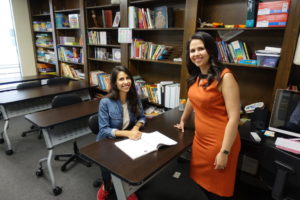Thanks to CDC Small Business Finance and CNote for this story!
 Before Maria Harrington was a business owner or even a teacher, she was a student at Berkeley exploring a question: How are indigenous cultures changing in terms of language and culture, given mass migration to the US? In her research, she followed a connection to Chiapas, the southernmost state in Mexico. There, she lodged with the indigenous family of a friend in their jungle community.
Before Maria Harrington was a business owner or even a teacher, she was a student at Berkeley exploring a question: How are indigenous cultures changing in terms of language and culture, given mass migration to the US? In her research, she followed a connection to Chiapas, the southernmost state in Mexico. There, she lodged with the indigenous family of a friend in their jungle community.
“The family — they’re just so warm,” Maria recounted, “but they have the problem of economic development… The world has become global, and they just got electricity just five years before I had gotten there.”
“After I was done and I’d finished my thesis, I decided that I wanted to give back.” So in 2008, Maria founded Help Chiapas, a non-profit dedicated to the long-term economic development of the indigenous community. Along with raising funds and providing services, the organization offers English camps to the children every year in the hopes of giving them more opportunity in tourism and other industries.
In 2011, Maria founded Casa de Español, a language school and cultural hub, established in part to fund the development going on through Help Chiapas. The capital they make goes towards building a cultural center in Chiapas, which will provide jobs for locals and exhibit the beautiful Mayan culture. And every summer, Maria brings a group of students there to volunteer in the children’s camps and health services. The impact goes two ways: from the students, who grow in their cultural awareness and appreciation, to the natives, who benefit from the programs.
 But the thread of economic development can be traced even further, from Chiapas and Casa to CDFIs like CDC and the Small Business Administration. At an earlier stage of its history, Casa de Español needed outside capital, too.
But the thread of economic development can be traced even further, from Chiapas and Casa to CDFIs like CDC and the Small Business Administration. At an earlier stage of its history, Casa de Español needed outside capital, too.
“We only started with me at the beginning,” laughs Maria, but before long, the business proved successful and grew fourfold. However, that meant getting a loan from CDC to accommodate for the influx of students both with staff and added space.
“With the small business loan we were able to hire new employees as well as remodel the space…,” Maria recounted gratefully. “Being able to have that loan just gave us the peace of mind of not having to worry about that portion when there were so many other things that we had to worry about.”
But she is most thankful for organizations such as CDC and the SBA, and the guidance they provide, especially to idealistic, but non-business educated visionaries like herself: “We love what we do, we’re masters of our craft; for example, I’m a master teacher. But then how do we turn that into a business that’s successful?”
Thankfully, experts from SBA were able to answer that question for her. They walked her through the entrepreneurial process, from developing a business plan to finding the proper lawyer. And now Casa de Español is a successful business and thriving center of cultural education.
